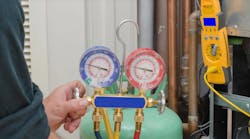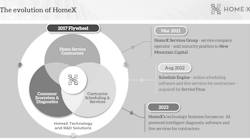One of the themes of the June Contracting Business is "communication." For my contribution, I thought I'd mention some common places I've observed with room for improvement.
Replacement Salespeople
Provide salespeople with complete details on the source of the lead. Don't just say it's "a referral." Who referred the prospect? From that point, someone, and it could be the salesperson, should research what the referring customer purchased, what they paid for it, and who sold it to them.
Provide salespeople with complete details on the source of the lead. Don't just say it's "a referral."
When given a lead generated by a service technician, talk to the tech before running the lead. Just as important is that you talk to the tech after you run the lead, whether the job sells or not. Most of the time, when I was unable to close a tech lead on the first visit, when I called the tech, I was provided with valuable information that would help me follow up. Usually, when I'd tell them the job didn't close, they'd say something like, "Well, did you tell them . . . ?" and mention something I was unaware of or hadn't thought of, and that would give me a more valid reason to follow-up than just calling to ask if they'd made up their mind yet. I could open the follow-up conversation with something like, "I was talking to the technician who worked on your system, and he said ..."
Scheduling Residential Replacement Salespeople
It's unrealistic to expect salespeople to be available to run appointments at any random time 12-14 hours per day, five to six days per week. They have to have a life, and that requires time devoted to their families and their own interests and needs. Furthermore, good salespeople spend about half their time doing follow-ups. It's imperative that salespeople keep whoever is in charge of their schedule updated.
There needs to be a community calendar where all this is kept up-to-date and salespeople can block out times when they're unavailable for personal reasons, or they've scheduled a follow-up call. This can be done with a good, old fashioned paper appointment book that is kept in a central location, or with software you probably already have. If you don't already have software to do this with, use Google Calendar.
Silence Your Cell Phone
Keep your mobile phone with you at all times as a safety factor, but shut off the ringer.
Do not allow a cell phone to interrupt a conversation with a customer. Don't even let it vibrate.
Do not allow a cell phone to interrupt a conversation with a customer. Don't even let it vibrate.
The only cell phone conversation you should make or take while you’re running a call is when you say to the customer, “I’m going to call so-and-so to check on something for you.” Even then, let them know you’re making a cell phone call to somehow benefit them.
Incoming Phone Calls
A lot of companies record all incoming calls these days, however, few of these phone calls are listened to unless there's a problem. I can't stress the importance of you listening to these incoming calls. If you don't record the calls, call your office occasionally as if you were a customer. You may be in for a very sorry surprise.
The majority of times I call a contractor, I can't understand the name of the company. Usually, when I ask them to repeat it, I still can't understand it.
Listening to how incoming requests for service are answered is usually something of a disappointment as well. I won't go into detail here. Just do it. Answering the phone is one of the most important jobs in a service business.
Technicians
If your company is set up for you to have the ability to listen to the incoming request for service over the phone, do it.
The best service manager I ever knew met with each of his 30 service technicians, one-on-one, once per week, at the same time every week, for 10-minutes.
When you run other techs' callbacks, call them before you run their callbacks.
Service Managers
The best service manager I ever knew met with each of his 30 service technicians, one-on-one, once per week, at the same time every week, for 10-minutes. This was a very well respected, very profitable, award-winning company that has attainted national recognition for a lot of good things.
The agenda of the meeting was simple. Every week they decided together on one thing the tech was going to work on that week to improve. When they met, the techs reported on the progress made the previous week, and they then decided on what the tech would work on the next week.
Charlie Greer is the creator of "Who Answers the Phone?" which is a short course on how to recruit, hire, and train someone to properly answer your phone. It comes complete with scripts. For information on Charlie's products and services, call 1-800-963-HVAC (4822), or visit www.hvacprofitboosters.com. Email your comments on this column or your questions on HVAC sales to [email protected].









